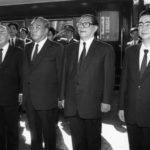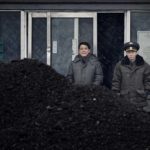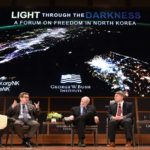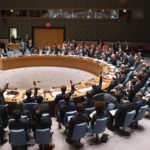December 4, 2017, by Marie DuMond—
South Korea and the United States generally share similar estimations of China’s and Japan’s blind spots in a unification scenario. Both believe that Beijing has the most prominent blind spot on domestic stabilization and refugees, and that Japan shares similar concerns, suggesting that all four powers could prioritize law and order in a unification scenario.
October 18, 2017, by Marie DuMond—
Domestic stabilization is the most critical issue with unification for South Korean officials and experts, registering the highest composite score (i.e., high level of concern and low level of knowledge). This means civil-military relations, law and order, and stability in the North represent the issues for which Koreans see great consequences for national interests, but for which they have little prior knowledge or understanding. Hence, it is the greatest potential “blind spot” of unification. Costs related to unification rank a close second for South Koreans, followed by refugees, nuclear weapons, and human rights.
August 25, 2017—
Kong Xuanyou is China’s new Special Representative for Korean Peninsula Affairs. He replaces the retiring Wu Dawei, who had held the position since its creation in 2010 and led the Chinese delegation to the Six-Party Talks since August 2004. Kong is an experienced diplomat having worked in the Ministry of Foreign Affairs of China for 32 years.
April 3, 2017—
To examine the closeness of the China-North Korea relationship, Beyond Parallel created an original dataset of all high-level visits between the two countries from 1953 to the present... To examine the closeness of the China-North Korea relationship, Beyond Parallel created an original dataset…
February 20, 2017, by Victor Cha—
The Chinese government announced that it would halt coal imports from North Korea starting from February 19 to the end of the year... The Chinese Ministry of Commerce and General Administration of Customs announced (statement in Chinese) on February 18 that it would halt coal imports from North...
February 2, 2017, by Bridget Coggins—
Refugees, and the fate of civilians in general, are critical to planning in case of dramatic political instability in North Korea... Refugees, and the fate of civilians in general, are critical to planning in case of dramatic political instability in North Korea. Most concerning strategically is...
December 9, 2016—
A new report titled “Toward a New Policy and Strategy for North Korea co-authored by Dr. Victor Cha and Ambassador Robert Gallucci was published this month. The report seeks to bridge the gap between the national security and human rights communities and argues for a new U.S. policy that integrates efforts toward dealing with North Korean security threats with approaches that focus on human freedom in the country.
August 23, 2016—
Developing the UN Commission of Inquiry on Human Rights in North Korea Report... The United Nations Human Rights Council established the Commission of Inquiry (COI) on Human Rights in the Democratic People’s Republic of Korea (DPRK) on March 21, 2013. The mission of the Commission was to investigate…
July 13, 2016, by Patrick M. Cronin—
Kim Jong-un’s regime has been systematically sanctioned since early this calendar year. Recent measures build on years of international sanctions on North Korea... Kim Jong-un’s regime has been systematically sanctioned since early this calendar year. Recent measures build…
June 1, 2016, by Lisa Collins and Victor Cha—
The Department of the Treasury’s Notice of Finding published on June 2, 2016 designates North Korea for the first time as a jurisdiction of “primary money laundering concern” under Section 311 of the USA PATRIOT Act... The Department of the Treasury's Notice of Finding published on June 2, 2016 designates North…









